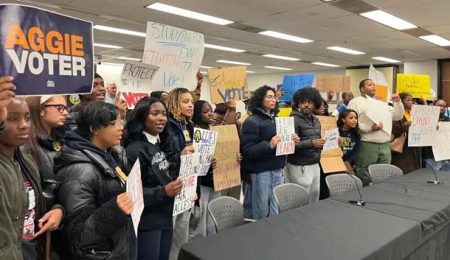Pastor Spencer Hardaway Runs Write-In Campaign

Also in the City Council race, though not on the ballot, is Pastor Spencer Hardaway of Rock Hill Baptist Church.
He began considering a run last January, but his sister was hospitalized and he was with her in Ohio when the filing period came and went. And as he listened to the declared candidates, he didn’t hear them talking much about issues he considered important, so this fall he decided to forge ahead as a write-in candidate.
Hardaway rejects labels like liberal and conservative, libertarian and progressive, considering himself a candidate who is a servant. “I believe I can serve God by serving people. I served the country for thirty-five years, and I would like to serve the city and the people of Asheville.” A short profile of the candidate and highlights of his platform follows.
Community empowerment
Hardaway’s primary goal is to ensure that people have a voice in building back a community in Asheville. He has served with the Asheville Neighborhood Advisory Committee, meeting with neighborhoods in all quarters of the city, and “our neighborhoods don’t have a voice.”
Community members developed a 2025 plan for Shiloh, but it has not been adhered to by developers. Hardaway wants to re-set the agenda so neighborhood residents—in all of Asheville’s neighborhoods—feel that they’re part of the process and have a voice in how development happens and where money is spent.
Jobs & housing
Job opportunities are another aspect of community empowerment Hardaway focuses on. “When I think of economic growth and development, there’s a right way that brings in jobs so that our quality of life improves.” Part of Hardaway’s platform is his plan to employ youth 14-17 so they have summer work, have money in their pockets, build self-esteem, and get the experience of working for a living.
“Jobs are not a cure-all but they benefit all. Good jobs matter so that people who live in the city can make a living from their wage, so that people who work in the city can afford to live in the city. But so many people live outside of Asheville because they can’t afford a house inside.” And for that, he says, “We need affordable housing—not poverty housing, but houses that working people can afford to buy or rent.
Green growth
Hardaway also wants to ensure sensible development that respects the beauty of the area. “People come here to visit, they relocate here, retire here, not because of all the hotels and parking lots,” says Hardaway. “They stay in the hotels and park their cars here, but they come here for the beauty of the area. So what’s the right way to develop land, how do we attract developers who believe the same way we do?”
Social conscience
After 35 years in the Army, Hardaway believe he can bring both leadership experience and a social conscience to City Council, and to the city as a whole. Asheville is an attraction for a lot of people, he notes, but “it’s also identified as a place where people born in poverty remain in poverty. I’d like the city to work closely with organizations that are working on racism, housing inequities, other social issues, and bring them on board to have them involved in the process.”







